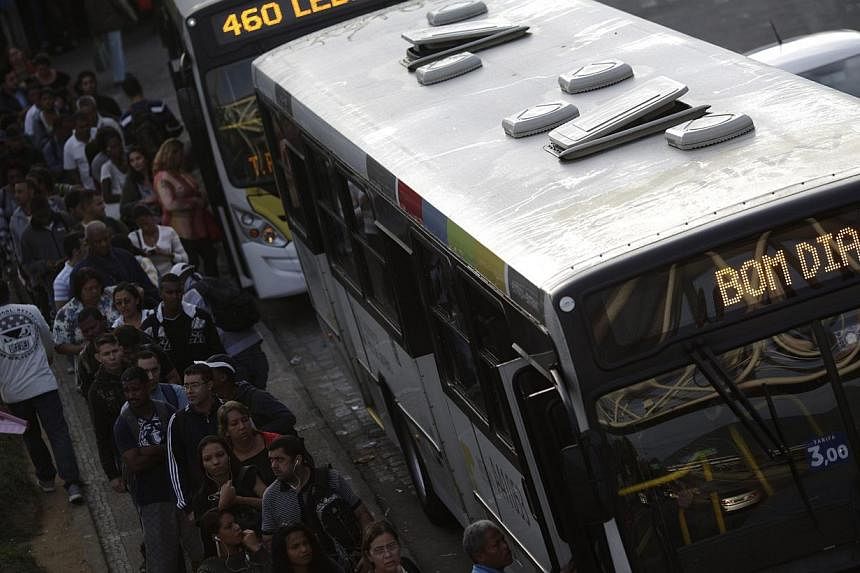RIO DE JANEIRO (AFP) - Less than a month from the World Cup, Brazil faced a new series of potentially disruptive strikes Wednesday as Rio de Janeiro bus drivers refused to end their walkout and federal police weighed a nationwide strike.
The striking Rio bus drivers ignored a court order to provide a minimum level of service, trashing buses and causing traffic chaos in the city for the second straight day.
Federal police officers meanwhile said they were considering going on strike nationwide - expanding a three-day walkout that has affected several states - despite a court ruling forbidding them to strike during the World Cup, which opens June 12.
The officers want their pay packages overhauled and the force itself to be restructured, and could take a decision on a nationwide strike Wednesday or Thursday if the government does not answer their demands, said Jose Nedel Fagundes, their union's strategy chief.
"You can't ask for public security if the police force is bureaucratic, out of date and now demotivated," he told AFP. "I don't want to alarm people, but it's really going to bring everything to a halt."
The federal police are in charge of border security and immigration services, and the strike threat comes just as an estimated 600,000 foreigners are about to descend on the country for the World Cup.
Brazilian consular workers are also on strike in various cities around the world, including New York and Paris, at a time when thousands of tourists are seeking visas.
And military police went on strike Wednesday in the northeastern state of Pernambuco, newspaper Folha de Sao Paulo reported on its website, saying police stations were closed in the tourist attraction Marco Zero neighborhood of Recife, the state capital and one of 12 World Cup host cities.
In Rio, striking bus drivers trashed 14 buses on Wednesday and 158 the day before, said police, bringing the total number of vehicles attacked since the strike began to 703 despite a plea from President Dilma Rousseff for non-violence in the run-up to the World Cup.
Last year's Confederations Cup was marred by huge protests, some of them violent.
The strike paralysed 60 per cent of Rio's privately run bus fleet despite a court threatening to fine the drivers' union 50,000 reais (S$28,369) a day if it failed to keep at least 70 per cent of buses on the road.
The strikers are demanding monthly salaries of 2,500 reais - a 40-per cent raise - and an end to their double duty as drivers and fare collectors.
Officials say two million of Rio's 6.3 million people depend on buses.
Despite the deployment of military police to protect the buses in service, fear of reprisal attacks kept many drivers home.
Daily newspaper O Dia ran a front-page photo of a strike-breaking driver disguised in a fake beard and glasses.
"There are more than 40,000 bus drivers and fare-collectors in Rio and this movement has 0.1-per cent support. That shows these people's opportunism," said Rio state Governor Luiz Fernando Pezao.
The strike has exposed deep divisions in the drivers' union, Sintraturb-Rio, which opposes it but has been powerless to override the strikers, who say they feel the union does not represent them.
"The problem is that the union doesn't want to come negotiate," said strike leader Helio Teodoro.
"That claim doesn't make any sense. This is a political action by a group that has infiltrated our union and wants to paralyse Rio during the World Cup," said union boss Leilo Teixeira.
Brazil is scheduled to hold general elections in October, raising the stakes for political leaders working to stage a successful World Cup.

